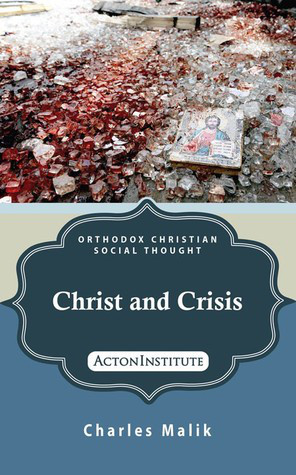
Christ and Crisis, Charles Malik. Grand Rapids, MI: Acton Institute, 2015 (originally published by Wm. B. Eerdmans, 1962).
Summary: Contends that the deepest crisis of his (our) age is a spiritual crisis that the church properly addresses by laying hold of all the resources and pursuing the calling of people of faith.
Charles Malik was a Lebanese diplomat and a drafter of the 1948 Universal Declaration of Human Rights as well as a later U.N. convention against genocide. He presided over the 1958 U.N. General Assembly and later taught at Harvard, Dartmouth, Notre Dame and American University. He was a thoughtful and deeply committed Orthodox Christian involved in several international ecumenical causes.
Malik wrote this book as the world faced the aggressive advance of Communism in the years following World War II, when nations were gaining dependence from colonial powers and the West was attempting to re-define the place of democracy in the world order. It was a time of crisis and activism and Malik was in the midst of it all.
Contrary to what you might expect, this book is not a call to Christian social activism, to political engagement in the crises of the day. Rather Malik, especially in the opening address (the book is a transcription of seven addresses Malik gave in this period), argues that the most significant crisis the world is facing is a crisis of spirit and the most significant calling of the church is to pursue the disciplines of devotion, the practices of holiness, and courageous witness to the message of the gospel. At one point he speaks disparagingly of churchmen who wade into international affairs and social issues about which they know little.
In some respects, he sounds like more modern writers like John Howard Yoder and Stanley Hauerwas in calling for the church to be the church and as such be its own distinctive order in the world. But there is a crucial difference–he is not a pacifist but one who might be in the principled just war camp. He writes at one point:
War is terrible, and not only will a Christian not provoke it, but he will do everything in his power to prevent it from breaking out. But six things do not follow from this: (1) It does not follow that if war is forced upon him that he will not defend himself; (2) nor does it follow that he will not in advance prepare to defend himself, since there is nothing to guarantee that war will not be forced upon him; (3) nor does it follow that if and when war is forced upon him he will not fight like a man or will not fight for complete victory; (4) nor does it follow that, since cold war is a kind of war, he will not fight it to victory; (5) nor does it follow that under conditions of war, whether cold or hot, he will blaspheme God and cease to be a Christian, loving Christ above everything else and his neighbor as himself; (6) nor, finally, does it follow that, if he is opposed to war, he has any right to be opposed only to that form of war which is “international,” namely, war between the nations, while saying nothing whatsoever about that other form of war which goes by the name of “class war,” namely, war between social and economic classes which could be just as terrible and just as unjust and just as devastating as any so-called “international war.” (p. 100)
Here we have thoughtful, nuanced, and “both-and” thinking, that while not finding agreement with everyone, transcended simplistic and polarized positions of his time and ours.
While addressing the great crises of his day, he also spoke trenchantly to the challenges all Christians face that he summarizes as coming on six fronts: the world and its temptations, our own memories, our tendency to sloth, our inveterate pride, our daily temptation to worship things and objects, and finally, the lures of the Enemy (pp. 65-66).
This is a book that speaks into our own activist age. Those who identify as progressive may not agree, but I hope they will engage with his critique of his own age and his analysis of the spiritual dimensions of the crises we face and our response to them.
Disclosure of Material Connection: I received this book free from the publisher. I was not required to write a positive review. The opinions I have expressed are my own. I am disclosing this in accordance with the Federal Trade Commission’s 16 CFR, Part 255 : “Guides Concerning the Use of Endorsements and Testimonials in Advertising.”
Editor’s Note: Thank-you to Bob Trube for sharing his reviews with Emerging Scholars! Bob first posted the above review on Bob on Books. ~ Thomas B. Grosh IV, Associate Director, Emerging Scholars Network
Bob Trube is Associate Director of Faculty Ministry and Director of the Emerging Scholars Network. He blogs on books regularly at bobonbooks.com. He resides in Columbus, Ohio, with Marilyn and enjoys reading, gardening, choral singing, and plein air painting.

Leave a Reply